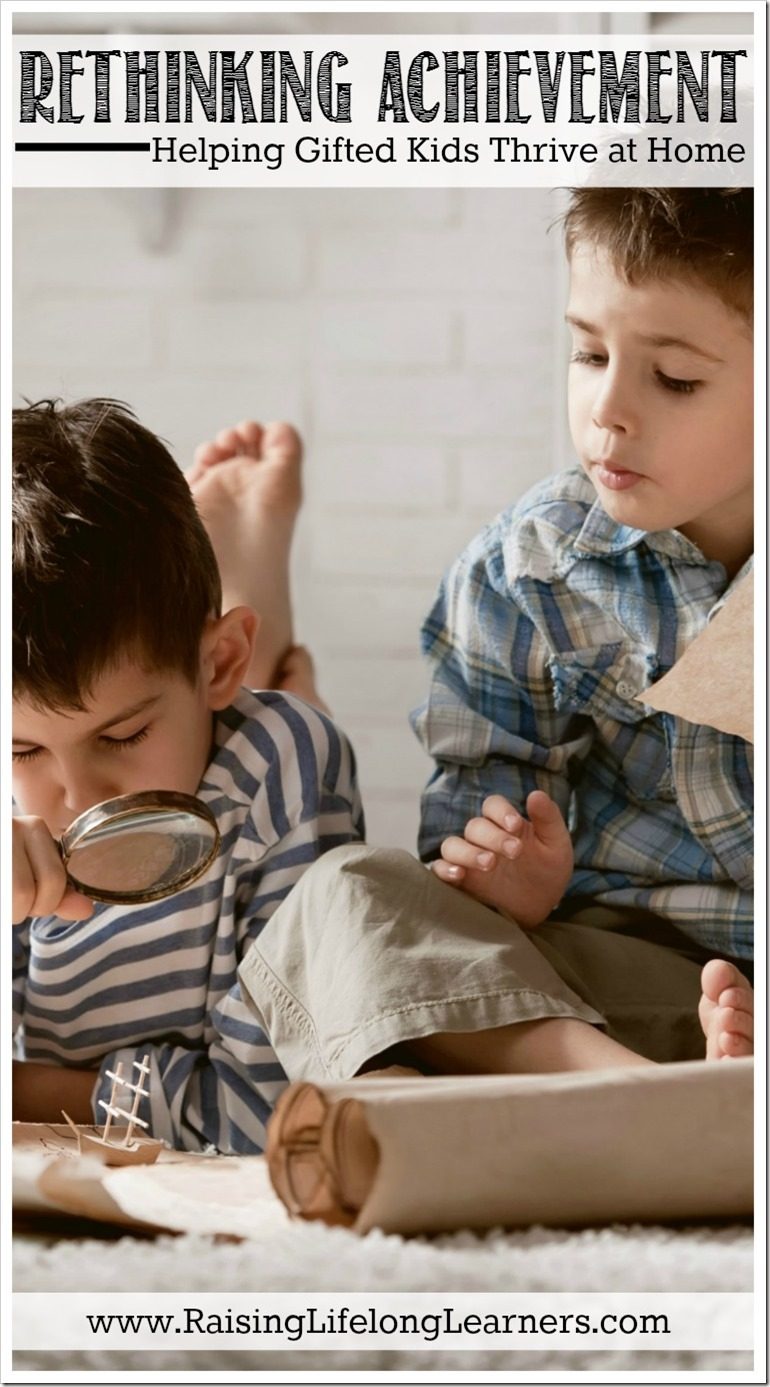Rethinking Achievement | Helping Gifted Kids Thrive at Home
I’m a huge proponent of interest and play based learning. Kids learn best when they are engaged and invested in their own education.
Years ago, my son’s preschool teacher told me that Trevor was the most “extreme thinker” she’d ever had in any of her four-year-old classes in the 30+ years she’d been teaching. That he couldn’t sit still, but she knew it was because he had so much to say and there was so much to discover.
It was a great environment for him – and one in which he could excel. She provided alternative activities for him to work on while the others learned their letters and colors. He thrived.
He did so well because his learning style was respected, his questions were encouraged, and he was loved. Unfortunately, this wasn’t the case as he went on to Kindergarten and then first grade, prompting us to change the way my husband and I had always looked at education and take on a formerly unknown method of learning – homeschooling.
Here’s the thing…
Raising a lifelong learner takes courage, and a certain trust in following your gifted child’s lead. Remember that gifted children think differently than same age, neurotypical children. They are asynchronous and often have their own agendas.
As homeschooling parents of gifted kids, we need to revise our perspectives when it comes to achievement. Most people think that kids need to follow a linear path when it comes to learning. And, while it’s true that some subjects like math tend to build upon themselves, one skill at a time, that’s just not the case for most of what kids learn during their childhood.
And, forcing gifted kids to learn the way neurotypical kids learn can often lead to underachievement and a lack of motivation.
It doesn’t really matter whether or not a child learns about outer space, rocks and minerals, or the classifications of animals first. If your homeschooler is interested in animals, embrace that. Put away the physical science book you’d pulled out, and stock the shelves with animal books, queue up animal documentaries, and visit a nature center or zoo.
Let me give you an example…
I’d planned to pull out some crystal making kits I had stored away in the basement the other day. We all were a bit stir crazy, though, and nobody wanted to make crystals (can you believe that?!), so I decided to take them back to a nature center we’d recently visited for a class to see if we could feed the birds again. We ended up having the place to ourselves, along with three naturalists who were taken with the kids and their questions.
One pulled out the center’s rat snake and handed it over to my oldest when the snake gravitated towards him, and it was clear that they were comfortable with one another. The snake crawled in and out of my son’s hood, finally curling up in his pocket while he chatted about snakes, their habits, and their anatomy with the naturalist. We left with a thorough understanding of reptiles, a field guide to snakes in Ohio, an invitation for Trevor to volunteer in the center when he turns 14 next year, and them taking my phone number down so they could call us when it’s time to feed the snake next. They want me to bring Trevor up so he can feed it himself.
It’s taken me a few years, but now I can embrace the fact that education and achievement doesn’t have to look like school, and it doesn’t have to follow a prescribed path.
The experience that my kids got with that snake and the patient naturalists who took the time to engage and appreciate them, particularly my oldest, will give them a better understanding and appreciation for reptiles than they would have gotten from any project I could have designed or prepared on my own timeline.
Crystals are put away for now, and we’re embarking on some snake science activities. Perfect for the backyard scientist in each of them.
And everyone is happy.
Let’s face it… the best and most authentic achievement is what happens when we stop focusing on shading in bubbles and checking off columns. It’s what happens when we follow our kids’ passions and interests.
The biggest thing I’ve learned since beginning to homeschool my gifted children – and believe me, I’ve learned a lot – is that if I get out of the way and trust the process, they will learn. And they will thrive.
How about you? What types of alternative achievement has you learned to roll with? How has it enriched your homeschool?
For more posts about parenting gifted kids, check out:
This post is part of the Hoagies Gifted Page’s February blog hop. For more posts about other types of achievement, head on over to their page.





